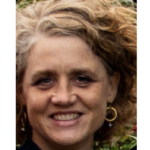
School Psychologist
Japan/USA
"I was in a work environment at a time when I and others were suffering, and my Capstone Project allowed me to create a space to contemplate our experience and embody the richness that compassion creates. My favorite part of being in ACT was our community — we immediately connected and melded over our shared purpose and intentionality."
Capstone Project
Creating a Contemplative Space in Schools
Who did your Capstone Project serve ?
My project served the students and staff of Nagoya International School in Nagoya, Japan.
What was the suffering that your project addressed?
The project addressed the challenges surrounding a loss the school community was facing — more than 100 students were leaving due to a project cancellation at a local company. Teachers were being asked to leave; the staff was facing a reduction in force.
How did this project address that suffering?
We created a contemplative space within the school campus where staff and students could reflect, both actively and passively. During a time when many were feeling controlled in their actions, the space was a place to exhale, think and feel.
Who was your audience and how many people participated?
The audience comprised the entire student body (aged 3-18) and the staff. It is hard to know what percentage of the student body participated, but all of the ages were welcomed and participated.
How was the project delivered (the format)?
The project was delivered in person in the community room in the school. We papered the walls with pictures, quotes and questions and left them up until the last day of school. We invited people to write on the walls and they shared how they felt during their time at NIS and what they hoped for in the future. They wrote in English, Japanese, Korean, French and Portuguese.
What was the reported impact on or feedback from participants? On yourself?
One student reported: “I was struggling with the idea that some of my most beloved teachers and mentors were going to leave soon. I was able to get my emotions out on the walls, and even though I wanted to write more, I was able to register and understand what I was feeling better.”
A staff member said “It provided an opportunity to stop and think. We all get trapped into moving forward and we simply forget important things. This allowed me to realize how worn down I was, how much I missed my children, and that it was ok to feel bad because if these feelings are not addressed it is impossible to truly move forward.”
How has the ACT Program helped you become an Ambassador of Compassion?
The project showed me the power of action, that compassion is there for us at all times. Suffering is frequently invisible and unspoken, yet moving into compassion creates a release where we can move from our individual pain to a collective, shared space.
What advice would you give to someone who’s considering participating in the ACT Program?
Do it! Do it, do it, do it. I am so sad this is over, and it’s a good sad. It’s the sadness of a great vacation coming to an end, a great epic journey’s last couple of pages. The world needs you, and most importantly you and your community need you.
